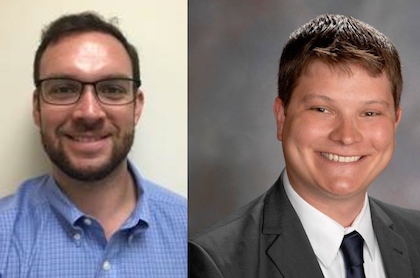The University of Vermont’s Clinical Simulation Lab is pleased to welcome two new Simulation Fellows for 2018-2019: Stephen Ranney, M.D., and Nicholas Bedrin, M.D.

2018-19 UVM Clinical Simulation Lab Fellows Stephen Ranney, M.D., (left) and Nicholas Bedrin, M.D. (Courtesy photos)
The University of Vermont’s Clinical Simulation Lab is pleased to welcome two new Simulation Fellows for 2018-2019.
The aim of an American College of Surgeons (ACS)-Accreditation of Education Institutes (AEI) accredited Fellowship Program is to improve the quality of surgical care by developing future leaders and scholars in the area of surgical education, simulation and training. The overall goals of the ACS -AEI Fellowship Program are to ensure that Fellows possess the requisite knowledge and skills to serve as local and national resources in the field of simulation-based surgical education and training, develop surgeons with a thorough understanding and knowledge in education theory in simulation and practice, train Fellows to serve as future leaders of simulation centers and to run an accredited Education Institute, enable Fellows through the use of their own resources to enhance the efficacy of their own programs, and ensure Fellows are trained in developing and implementing major research development projects.
Stephen Ranney, M.D., is a general surgery resident at the UVM Medical Center spending his research year as a simulation fellow. Originally from Mid-Coast Maine, Ranney who received his M.D. from the Tufts University School of Medicine, is hoping to develop and implement an interprofessional simulation curriculum for the Surgical Intensive Care Unit at UVM Medical Center. For his Surgical Education Research Fellowship through the Association for Surgical Education, he will be examining the impact of empowering residents to lead briefing and debriefing in the operating room to determine if it promotes guided learning.
Like Ranney, Nicholas Bedrin, M.D., is a general surgery resident at the UVM Medical Center who is participating in a simulation fellowship for his research year. A Vermont native who grew up in Grand Isle, Bedrin received his undergraduate degree from UVM, then attended medical school at New York Medical College. In addition to his ACS-AEI Fellowship in the Simulation Lab, he is completing a Surgical Education Research Fellowship, focusing on identifying barriers within simulation and how to improve access to simulation, specifically for surgical residents. In the Simulation Lab, he hopes to explore virtual reality simulators and high-fidelity simulations and hopes to improve upon their use at the Simulation Lab. Bedrin is interested in pediatric surgery and trauma surgery.
The UVM Clinical Simulation Lab clinical simulation fellowship offers an intensive, hands-on fellowship in the techniques of clinical simulation and healthcare education is designed to provide participants with the knowledge and skills to enhance their abilities as teachers and leaders of education programs. Learn more about the Clinical Simulation Laboratory Fellowship program.